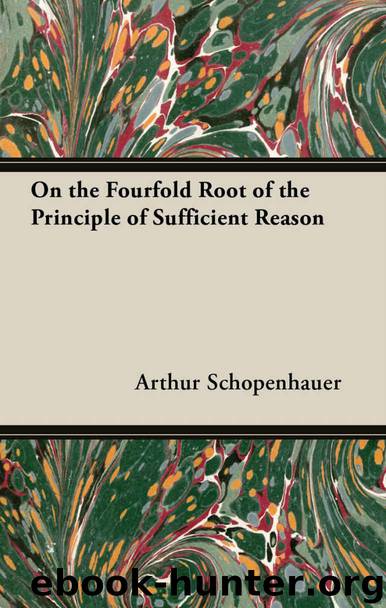On the Fourfold Root of the Principle of Sufficient Reason by Arthur Schopenhauer

Author:Arthur Schopenhauer [Schopenhauer, Arthur]
Language: eng
Format: azw3
Publisher: Read Books Ltd.
Published: 2013-04-16T04:00:00+00:00
1 And this infatuation has reached such a point, that people seriously imagine themselves to have found the key to the mystery of the essence and existence of this wonderful and mysterious world in wretched chemical affinities! Compared with this illusion of our physiological chemists, that of the alchymists who sought after the philosopher’s stone, and only hoped to find out the secret of making gold, was indeed a mere trifle. [Add. to 3rd ed.]
2 “Aut catechismus, aut materialismus,” is their watchword. [Add. to 3rd ed.]
1 There too he will meet with people who fling about words of foreign origin, which they have caught up without understanding them, just as readily as he does himself, when he talks about “Idealism” without knowing what it means, mostly therefore using the word instead of Spiritualism (which being Realism, is the opposite to Idealism). Hundreds of examples of this kind besides other quid pro quos are to be found in books, and critical periodicals. [Add. to 3rd ed.]
1 They ought everywhere to be shown that their belief is not believed in. [Add. to 3rd ed.]
1 For revelation goes for nothing in philosophy; therefore a philosopher must before all things be an unbeliever. [Add. to 3rd. ed.].
1 One always says the other is right, so that the public in its simplicity at last imagines them really to be right. [Add. to 3rd ed.]
1 Here it is especially Ernst Reinhold’s “System of Metaphysics” (3rd edition, 1854) that I have in my eye. In my “Parerga” I have explained how it comes, that brain-perverting books like this go through several editions. See “Parerga,” vol. i. p. 171 (2nd edition, vol. i. p. 194).
2 Nevertheless, by Zeus, all such gentlemen, in France as well as Germany, should be taught that Philosophy has a different mission from that of playing into the hands of the clergy. We must let them clearly see before all things that we have no faith in their faith—from this follows what we think of them. [Add. to 3rd ed.]
1 (a) Rosenkranz, “Meine Reform der Hegelschen Philosophie,” 1852, especially p. 41, in a pompous, dictatorial tone: “I have explicitly said, that Space and Time would not exist if Matter did not exist. Æther spread out within itself first constitutes real Space, and the movement of this æther and consequent real genesis of everything individual and separate, constitutes real Time.” (b) L. Noack, “Die Theologie als Religionsphilosophie,” 1853, pp. 8, 9. (c) V. Reuchlin-Meldegg. Two reviews of Oersted’s “Geist in der Natur” in the Heidelberg Annals, Nov.-Dec., 1850, and May-June, 1854.
2 Time is the condition of the possibility of succession, which could neither take place, nor be understood by us and expressed in words, without Time. And Space is likewise the condition of the possibility of juxtaposition, and Transcendental Æsthetic is the proof that these conditions have their seat in the constitution of our head. [Add. to 3rd ed.]
1 In the Scholium to the eighth of the definitions he has placed at the top of
Download
This site does not store any files on its server. We only index and link to content provided by other sites. Please contact the content providers to delete copyright contents if any and email us, we'll remove relevant links or contents immediately.
| Anthropology | Archaeology |
| Philosophy | Politics & Government |
| Social Sciences | Sociology |
| Women's Studies |
The remains of the day by Kazuo Ishiguro(8999)
Tools of Titans by Timothy Ferriss(8396)
Giovanni's Room by James Baldwin(7346)
The Black Swan by Nassim Nicholas Taleb(7129)
Inner Engineering: A Yogi's Guide to Joy by Sadhguru(6794)
The Way of Zen by Alan W. Watts(6614)
The Power of Now: A Guide to Spiritual Enlightenment by Eckhart Tolle(5781)
Asking the Right Questions: A Guide to Critical Thinking by M. Neil Browne & Stuart M. Keeley(5775)
The Six Wives Of Henry VIII (WOMEN IN HISTORY) by Fraser Antonia(5515)
Astrophysics for People in a Hurry by Neil DeGrasse Tyson(5190)
Housekeeping by Marilynne Robinson(4447)
12 Rules for Life by Jordan B. Peterson(4304)
Ikigai by Héctor García & Francesc Miralles(4274)
Double Down (Diary of a Wimpy Kid Book 11) by Jeff Kinney(4272)
The Ethical Slut by Janet W. Hardy(4253)
Skin in the Game by Nassim Nicholas Taleb(4248)
The Art of Happiness by The Dalai Lama(4130)
Skin in the Game: Hidden Asymmetries in Daily Life by Nassim Nicholas Taleb(4006)
Walking by Henry David Thoreau(3962)
